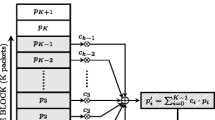Abstract
Wireless wide-area networks (WWANs) are characterized by very low and variable bandwidths, very high and variable delays, significant non-congestion related losses, asymmetric uplink and downlink channels, and occasional blackouts. Additionally, the majority of the latency in a WWAN connection is incurred over the wireless link. Under such operating conditions, most contemporary wireless TCP algorithms do not perform very well. In this paper, we present WTCP, a reliable transport protocol that addresses rate control and reliability over commercial WWAN networks such as CDPD. WTCP is rate-based, uses only end-to-end mechanisms, performs rate control at the receiver, and uses inter-packet delays as the primary metric for rate control. We have implemented and evaluated WTCP over the CDPD network, and also simulated it in the ns-2 simulator. Our results indicate that WTCP can improve on the performance of comparable algorithms such as TCP-NewReno, TCP-Vegas, and Snoop-TCP by between 20% to 200% for typical operating conditions.
Similar content being viewed by others
References
J. Agosta and T. Russle, CDPD: Cellular Digital Packet Data Standards and Technology (McGraw-Hill, New York, 1997).
A. Bakre and B.R. Badrinath, I-TCP: Indirect TCP for mobile hosts, in: Proceedings of International Conference on Distributed Computing Systems (1995).
H. Balakrishnan, V.N. Padmanabhan, S. Seshan and R. Katz, A comparison of mechanisms for improving TCP performance over wireless links, in: Proceedings of ACM SIGCOMM (1996).
H. Balakrishnan, S. Seshan, E. Amir and R. Katz, Improving TCP/IP performance over wireless networks, in: Proceedings of ACM MOBICOM (1995).
S. Biaz and N.H. Vaidya, Discriminating congestion losses from wireless losses using inter-arrival times at the receiver, in: Proceedings of IEEE Application Specific Systems and Software Engineering Technology (1999).
L. Brakmo and L. Peterson, End-to-end congestion avoidance on a global internet, IEEE Journal on Selected Areas in Communications 13(8) (October 1995) 1465–1480.
K. Brown and S. Singh, M-TCP: TCP for mobile cellular networks, ACM Computer Communications Review 27 (October 1997) 19–43.
R. Cáceres and L. Iftode, Improving the performance of reliable transport protocols in mobile computing environments, IEEE Journal on Selected Areas in Communications 13(5) (June 1995) 850–857.
D. Chiu and R. Jain, Analysis of the increase/decrease algorithms for congestion avoidance in computer networks, Journal of Computer Networks and ISDN 17(1) (June 1989) 1–14.
A. DeSimone, M. Chuah and O. Yue, Throughput performance of transport-layer protocols over wireless LANs, in: Proceedings of IEEE GLOBECOMM (1993).
R. Durst, E. Travis and G. Miller, TCP extensions for space communications, Wireless Networks 3(5) (1997) 389–403.
T.R. Henderson and R.H. Katz, Transport protocols for Internet-compatible satellite networks, IEEE Journal on Selected Areas in Communications 17(2) (February 1999) 345–359.
S. Keshav, Congestion control in computer networks, PhD thesis, UC Berkeley (1991).
T. Kim, S. Lu and V. Bharghavan, Improving congestion control performance through loss differentiation, in: Proceedings of IEEE International Conference on Computers and Communication (1999).
S. Kunniyur and R. Srikant, Fairness of congestion avoidance schemes in heterogeneous networks, in: Proceedings of International Teletraffic Congress (1999).
T.V. Lakshman and U. Madhow, The performance of TCP/IP for networks with high bandwidth-delay products and random loss, IEEE/ACM Transactions on Networking 5(3) (June 1997) 336–350.
M. Mathis, J. Mahdavi, S. Floyd and A. Romanow, TCP selective acknowledgement options, Internet RFC 2018 (October 1996).
Metricom, http://www.metricom.com/
T. Nandagopal, T. Kim, P. Sinha and V. Bharghavan, Service differentiation through end-to-end rate control in wireless packet networks, in: Proceedings of IEEE Mobile Multimedia Conference (1999).
V. Paxson, On calibrating measurements of packet transit times, ACM SIGMETRICS Performance Evaluation Review 26(1) (June 1998) 11–21.
S. Shenker, Some conjectures on the behavior of acknowledgment-based transmission control of random access communication channels, in: Proceedings of ACM Sigmetrics (1987).
The Qualcomm High Data Rate Wireless Network, http://www. qualcomm.com/hdr/
Wireless Data Forum, http://www.wirelessdata.org/
R. Yavatkar and N. Bhagawat, Improving end-to-end performance of TCP over mobile internetworks, in: Proceedings of IEEE Workshop on Mobile Computing Systems and Applications (1994).
Author information
Authors and Affiliations
Rights and permissions
About this article
Cite this article
Sinha, P., Nandagopal, T., Venkitaraman, N. et al. WTCP: A Reliable Transport Protocol for Wireless Wide-Area Networks. Wireless Networks 8, 301–316 (2002). https://doi.org/10.1023/A:1013702428498
Issue Date:
DOI: https://doi.org/10.1023/A:1013702428498




